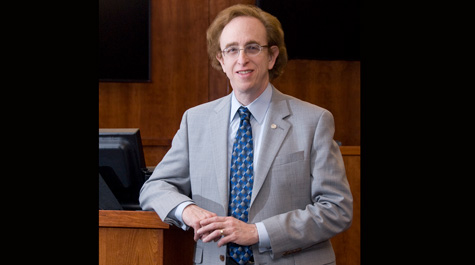William & Mary selected to join Public Interest Technology University Network
William & Mary has been selected to join a partnership of higher-education institutions that aims to form and build a new discipline that melds public-policy concerns with technological fields.
University President Katherine Rowe has designated Fredric Lederer to serve as William & Mary’s representative to the Public Interest Technology University Network, or PIT-UN. Lederer is Chancellor Professor at the university’s School of Law.
Lederer also serves as director of the law school’s Center for Legal & Court Technology, which has been examining and negotiating the challenges and opportunities in applying modern advances to the workings of the U.S. legal system.
“We have worked with courts in the U.S., Canada and other nations for years,” he said. “Our goal is always to find what type of technology — if any — will help them, rather than complicate their lives, particularly in dispute resolution.”
As an example, Lederer said the Center for Legal & Court Technology has been funded by Cisco Systems for a number of years to educate judges and lawyers on the legal ramifications of technological advances such as artificial intelligence and the Internet of Things.
“We’ve done that,” he said. “And we have created interdisciplinary courses for the university. Our work has largely been to ask how we can use technology for the public good.”
Many other William & Mary initiatives look to be a good fit for PIT-UN; Lederer cited the Global Research Institute as an example of work at the interface of tech and policy. The GRI is a multidisciplinary community that brings research savvy to bear in addressing complex global issues.
Lederer said he expects that his new role as PIT-UN representative will be a more widely focused version of his current work. He is optimistic about the promise of the PIT-UN collaboration, but notes that he is just getting introduced to the group.
“We are talking about technology that betters the public in the broadest possible scope,” he said. “Rather than something dedicated to the profit motive, or to generating funds for an individual institution, the goal is technology that will improve the public good.”
The PIT-UN website lists a variety of approaches to create what the organization terms “civic-minded technologists,” including curriculum and faculty development, initiatives such as clinics and fellowships and forging partnerships among like-minded public and private entities.
William & Mary becomes a member of PIT-UN in time for the organization’s Public Interest Technology University Network Challenge, which supports development of programs within academia by encouraging new ideas, fostering collaborations and incentivizing resource- and information-sharing among network members.
The application period for the challenge has begun. Deadline is July 15 and applications should be initiated through Lederer. Each PIT-UN member institution is limited to three applications. Proposals are invited in three funding tranches:
- Up to $45,000 for direct and indirect costs
- Up to $90,000 for direct and indirect costs
- Up to $180,000 for direct and indirect costs.
Luiza Newlin-Lukowicz spearheaded William & Mary’s application to join PIT-UN. Newlin-Lukowicz is senior director of corporate & foundation relations at the university. Her job in the university’s Office of Advancement involves identifying and cultivating potential support from private organizations. She said that PIT-UN came up during her team’s regular review of the funding landscape.
“It piqued our interest because it fit with many of the interdisciplinary, technology-related initiatives that William & Mary is pursuing,” she said, going on to explain that PIT-UN is a relatively new part of the New America Foundation, a public-policy oriented think tank.
Newlin-Lukowicz explained that PIT-UN operates as a clearinghouse for research funding, distributing financial support from foundation, corporate, individual and governmental sources. PIT-UN’s Network Challenge provides member institutions with exclusive opportunities to compete for grants that support research, curriculum, and capacity building activities designed to advance the nascent field of public interest technology.
“Of course, we’re thrilled about the potential of this new funding stream,” she said. “But we’re equally excited about the cross-institutional collaborations that might emerge from our membership. Many private funders are prioritizing multi-institutional initiatives and PIT-UN will provide the platform to incubate such partnerships.”
Lederer agrees, and says he believes participation in PIT-UN will be good for William & Mary on a number of levels. For starters, he hopes that PIT-UN membership will bolster the STEM profile of a university that’s more well known for contributions in the humanities and social-science aspects of the liberal arts.
“William & Mary has been very active in science,” he said, “and of course today, science also includes all things cyber. I think it’s fair to say that the outside world doesn’t fully appreciate the degree to which the university is active — and successful — in the sciences.”
 Skip to main content
Skip to main content

